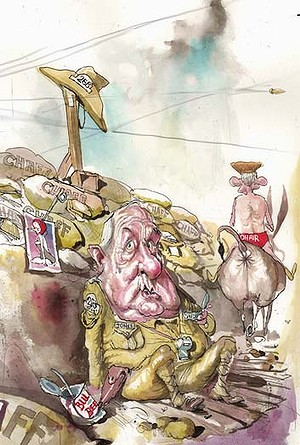Search
Democracy Links
Member's Off-site Blogs
getting it in the nek .....

It starts with ''b'' and it ends in ''t''. Found in paddocks, mushrooms love it, it squishes underfoot and this time every year we dig it in where we're going to plant tomatoes. Australians can smell it a mile off.
From it, the careers of so many indignant, megalomaniacal, self-deluding, bullying, pumped-up disc jockeys have flourished.
Yes, we Australians have great bullshit detectors. Which is why so many of us are still shaking our heads over that non-apology, absent, as it was, not only of genuine humility and conviction but also courage. What's the opposite of manning up?
There's no need to rake over all the very special things that were said - either to the crowd of jolly hockeysticksters who paid $100 to misspend a Saturday evening guffawing at a cruel joke about the Prime Minister's recently deceased father (dwarf gag, anyone?) or in implied justification of it all the next day.
But one line remains a standout. It was: ''In the trenches of Gallipoli people made black-humoured comments about facing death. A lot of people feel they have got their backs to the door.''
This was apparently a reference to the way Australians feel about the carbon tax and an implied justification for the offending speech.
As the centenary of Gallipoli approaches, a lot of tomato fertiliser will be written and said about the meaning of it all. You know? The Anzac spirit, the defining moment of our nation, mateship, honour and all that.
Maybe Gloria was just getting in early. But not as early as another equally famous - or perhaps infamous - Alan. Bond.
As Australia II contested the America's Cup in 1983 the then businessman, later jailbird, said: ''We had our backs to the wall there and we won that one.''
He was talking about Gallipoli where, for the record, ''we'' didn't actually win but retreated from, at night, just before Christmas 1915. But only after 8141 Australians were killed in an eight-month stand-off that achieved little or nothing.
The Australians' lot was tough in World War I. Not just at Gallipoli but in Egypt, Palestine and Syria (where about 1400 Australians died) and the European Western Front (where some 46,000 were killed, 18,000 of whom remain missing or could not be personally identified at death). Trench humour was, according to the returned, a fatalistic way of coping with watching friends and enemies die, with mud, heat, flies, the smell of rotting flesh and the imperative to kill to save oneself.
It wasn't unique to Australians; Erich Maria Remarque's All Quiet on the Western Front attests to the acerbic gallows humour of the Germans. This week I've been rereading the diary of Trooper Ernest Pauls of the 12th Australian Light Horse Regiment. Pauls, from Dorrigo, fought in Gallipoli and Palestine.
On September 28, 1915, he wrote at Gallipoli: ''Had some successful sniping at Turks today. Gave one a headache from a .303 pill.''
On September 30, Trooper Pauls wrote: ''This morning the Turks [sic] guns again opened fire on the Gully. The 12th regiment again suffering losses.''
Ion Idriess, who wrote the poignant, sometimes darkly funny The Desert Column about his war experiences, observed of the loss of one of the inexperienced men to whom Pauls referred: ''One of the 12th Light Horse has just been blown to pieces by a bomb. Poor chap, he was broken in all right.''
The Australians reserved their most biting humour for the figures of authority - English or Australian - who saw fit to dispense with their lives so blithely in tactical cock-ups.
A great Anzac fallacy is that only British command was flawed.
Most Australians know the dreadful Battle of the Nek on Gallipoli from Peter Weir's 1981 movie Gallipoli. The men of the 10th and 8th Light Horse were ordered to charge the Turkish guns, whereupon they were cut down in rows. The Nek remains an evocative Australian metaphor for the folly of British command - ironic, given Australia's Major General John Antill gave the order to ''press on''. Such is the potency of Anzac mythology.
The men themselves - who pilloried and parodied Antill after the Nek - probably would have appreciated the truth rather than the myth. The misuse of power and the abrogation of responsibility by a British officer was expected.
The same, by an Australian, was beneath contempt.
Life. Death. War. The carbon tax. What might the Australians in the trenches have made of such a conflation? Now - to the tomatoes.
- By John Richardson at 7 Oct 2012 - 4:16pm
- John Richardson's blog
- Login or register to post comments
Recent comments
1 hour 7 min ago
2 hours 29 min ago
4 hours 21 min ago
22 hours 34 min ago
1 day 27 min ago
1 day 1 hour ago
1 day 2 hours ago
1 day 2 hours ago
1 day 3 hours ago
1 day 3 hours ago